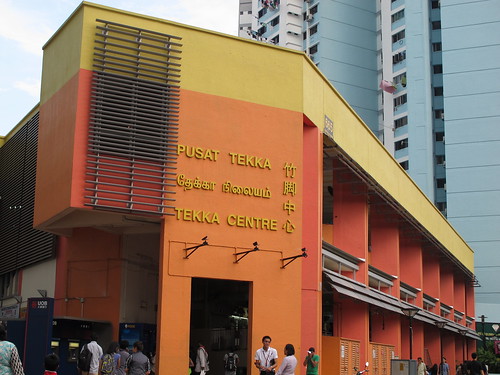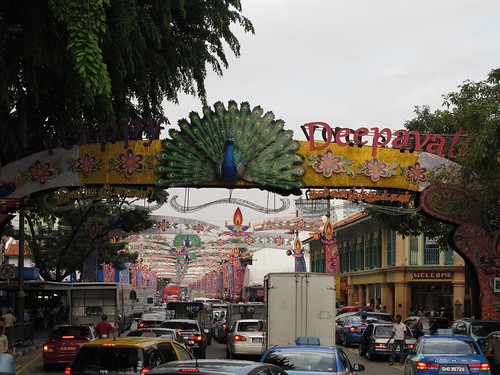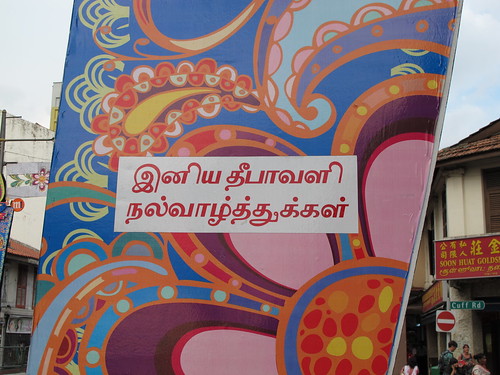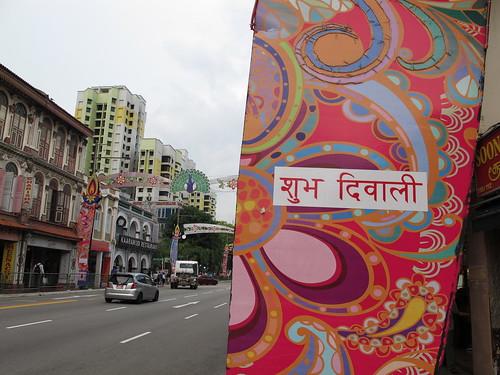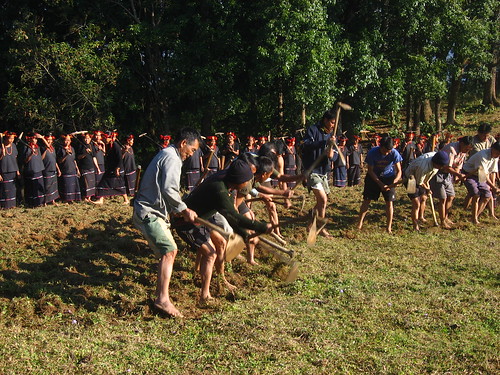This post is about three things: (1) the name of a very popular beverage that the vast majority of readers would be familiar with; (2) the name of a building complex near Little India that most Singaporeans would be familiar with; and (3) my family name, which only my friends would be familiar with (but which is actually a pretty common Chinese name around the world).
And yes, there's a linguistic point to all of this.
Let's start with what's least familiar: my last name, which happens to be Teo (I pronounce it as [thjo]). It is a Hokkine / Minnan name that has its origins in southern China. While it may not look familiar to most people outside SE Asia, it's actually etymologically related to one of the most common Chinese surnames around the world. The Chinese character used to write it is 张 (simplified) or 張 (traditional). The standard Mandarin equivalent is transliterated as Zhang in pinyin and pronounced as /tʂaŋ/ (tone not given) - it's like saying 'chunk', but (a) you don't have a final 'k' sound and (b) when you pronounce 'ch' sound, your tongue curls back a bit (this is what is called a 'retroflex' sound) and you shouldn't have a strong puff of air. The Cantonese equivalents I believe are transliterated as Cheung, Cheong or Chong, depending on the transliteration system.
Most of you will probably have started to recognise these names and probably even know people with one of these names. But you've also probably noticed that while the Mandarin and Cantonese forms look quite similar, the Minnan name Teo doesn't look (or sound) anything like the others. So how is it related?
Before I get to that point, let's look at the name of a famous building complex located in Little India, Singapore: the Tekka Centre. (I was just there a week ago with a friend from Australia.)
The Wikipedia article gives the original (Hokkien) name of the market as Tek Kia Kha, meaning 'foot of the small bamboos' which was eventually shortened to Tekka. For those who can read Chinese, you'll notice on the right the Chinese characters 竹 'bamboo' and 脚 'leg / foot'. The standard Mandarin reading of 竹 is zhu in pinyin and pronounced /tʂu/, while in Hokkien 竹 is transliterated as tek and pronounced something like /tɛk/.
Now I remember going on a school trip to Little India in the 1990s and being utterly confused because the centre had been renamed the 'Zhujiao Centre' to match the Mandarin reading of 竹脚. In reality, almost everyone still referred to it as the 'Tekka Market'. The building has since been renamed the 'Tekka Centre' to avoid confusion (which Wikipedia tells me happened in 2000).
The point was, I could see no resemblance between Mandarin zhu and Hokkien tek. Since then, I've also learnt a lot more about historical sound changes, and noticed other examples of Mandarin 'zh' (a retroflex sound) corresponding to Hokkien 't', like with my last name. Simply put, they are both said to have descended from a sequence of 't' and 'r' early in the history of Chinese. In the Minnan languages / dialects, including Hokkien, the 'r' sound was lost, while in other varieties, including standard Mandarin, the combination of 'tr' became a retroflex sound, as represented in pinyin by the letters zh. Pulleyblank (1991) reconstructs the pronunciation of 竹 as truwk in Early Middle Chinese and triwk in Late Middle Chinese. Guillaume Jacques here also gives 'tr' as an initial in Early Middle Chinese, with the pronunciation of 张 reconstructed as 'trjang'. We still see the 'tr' combination in the Vietnamese surname Trương / Truong. (Vietnamese is not Sinitic, but it was heavily influenced by it for centuries.)
Of course, this only explains how the first sounds in Teo and tek in Hokkien correspond to Zhang and zhu in Mandarin. To explain the rest would require more than a humble blog post.
So what does this have to do with all the tea in China (and all the chai in India)? Check out tomorrow's post.
And yes, there's a linguistic point to all of this.
Let's start with what's least familiar: my last name, which happens to be Teo (I pronounce it as [thjo]). It is a Hokkine / Minnan name that has its origins in southern China. While it may not look familiar to most people outside SE Asia, it's actually etymologically related to one of the most common Chinese surnames around the world. The Chinese character used to write it is 张 (simplified) or 張 (traditional). The standard Mandarin equivalent is transliterated as Zhang in pinyin and pronounced as /tʂaŋ/ (tone not given) - it's like saying 'chunk', but (a) you don't have a final 'k' sound and (b) when you pronounce 'ch' sound, your tongue curls back a bit (this is what is called a 'retroflex' sound) and you shouldn't have a strong puff of air. The Cantonese equivalents I believe are transliterated as Cheung, Cheong or Chong, depending on the transliteration system.
Most of you will probably have started to recognise these names and probably even know people with one of these names. But you've also probably noticed that while the Mandarin and Cantonese forms look quite similar, the Minnan name Teo doesn't look (or sound) anything like the others. So how is it related?
Before I get to that point, let's look at the name of a famous building complex located in Little India, Singapore: the Tekka Centre. (I was just there a week ago with a friend from Australia.)
The Wikipedia article gives the original (Hokkien) name of the market as Tek Kia Kha, meaning 'foot of the small bamboos' which was eventually shortened to Tekka. For those who can read Chinese, you'll notice on the right the Chinese characters 竹 'bamboo' and 脚 'leg / foot'. The standard Mandarin reading of 竹 is zhu in pinyin and pronounced /tʂu/, while in Hokkien 竹 is transliterated as tek and pronounced something like /tɛk/.
Now I remember going on a school trip to Little India in the 1990s and being utterly confused because the centre had been renamed the 'Zhujiao Centre' to match the Mandarin reading of 竹脚. In reality, almost everyone still referred to it as the 'Tekka Market'. The building has since been renamed the 'Tekka Centre' to avoid confusion (which Wikipedia tells me happened in 2000).
The point was, I could see no resemblance between Mandarin zhu and Hokkien tek. Since then, I've also learnt a lot more about historical sound changes, and noticed other examples of Mandarin 'zh' (a retroflex sound) corresponding to Hokkien 't', like with my last name. Simply put, they are both said to have descended from a sequence of 't' and 'r' early in the history of Chinese. In the Minnan languages / dialects, including Hokkien, the 'r' sound was lost, while in other varieties, including standard Mandarin, the combination of 'tr' became a retroflex sound, as represented in pinyin by the letters zh. Pulleyblank (1991) reconstructs the pronunciation of 竹 as truwk in Early Middle Chinese and triwk in Late Middle Chinese. Guillaume Jacques here also gives 'tr' as an initial in Early Middle Chinese, with the pronunciation of 张 reconstructed as 'trjang'. We still see the 'tr' combination in the Vietnamese surname Trương / Truong. (Vietnamese is not Sinitic, but it was heavily influenced by it for centuries.)
Of course, this only explains how the first sounds in Teo and tek in Hokkien correspond to Zhang and zhu in Mandarin. To explain the rest would require more than a humble blog post.
So what does this have to do with all the tea in China (and all the chai in India)? Check out tomorrow's post.
